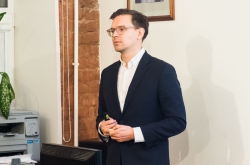The Days of Science Cinema is not a conventional film festival, but a non-profit social project. Any independent organization, be it a library, a contemporary art gallery, or a creative cluster, can join it. It’s up to participants to choose movies out of the 20 films present in the festival’s program. All the movies focus on the most topical issues of science, from the study of the brain to the effect of artificial intelligence on the number of workplaces.
The movies that were screened at ITMO University were chosen by the University’s Public Events Office’s staff. According to Margarita Polishchuk, a public relations specialist, this wasn’t that difficult of a choice.

“The first flick that caught our eye was about AlphaGo’s artificial intelligence. In this movie, an artificial intelligence learns to play games, while the developers strive to figure out how to equip it with intuition. ITMO University is all about cutting-edge computer technologies; that’s why we wanted our students to watch this movie. We hoped that it would give them food for thought and encourage them to create something just as complex and amazing," shares Ms. Polishchuk.
The second movie called “Let there be light!” follows the story of a dozen scientists from different countries who build an artificial star in a small French village. The authors attempt to ask the question of whether we need alternative energy and what can be done to protect the environment.

The festival’s main goal is to give the audience an insight into contemporary non-fiction movies, as well as involve students in the conversation about the importance of research.
After the screenings, there was a discussion with an invited expert on the film’s topic. This year, the discussion was moderated by Pavel Gulyaev, a programmer from the Computer Technologies international laboratory. During his lecture, he expanded on the AI from the movie and other triumphs of artificial intelligence over humans.

“Every year, technologies are becoming smarter and smarter,” shares Mr. Gulyaev. “About a year and a half ago, an artificial intelligence computer program (Libratus) beat four human poker pros, while this summer, OpenAI Five almost defeated humans in Dota 2. I think that among the most interesting latest developments in this field is the AI created by UC Berkeley. Their bot gets a reward for every correct action it performs, and that’s how it learns. In this research, the robot plays the Mario Bros. videogame. The team wanted their AI to explore new paths, rather than just follow the same actions over and over. In the process of training, it learned not only to jump over hurdles, but also kill its enemies in order to survive. It basically learned to set objectives. Impressive, isn’t it? We don’t know what it all will result in though, which remains one of the most pressing questions regarding AI.”
Why watch science cinema
We also asked the festival’s coordinators about why they watch non-fiction movies and what are their favorites.
Margarita Polishchuk shares that popular science is her source of inspiration. “There are many interesting, talented people who do wonderful things. They conduct research, make experiments, they stumble and fall but never give up. Of course, there are many ways you can make the world a better place without leaving your office but these guys went much further. Their stories are such a massive source of inspiration for me. I’ve watched many great fiction movies as well, but they don’t touch me that much as, say, a science movie about space by BBC. It’s something completely different.”
Pavel Gulyaev says that he doesn’t have time to watch long documentaries, so he watches similar videos on YouTube instead.

“I really like Siraj Raval’s channel. The guy talks about machine learning in a very fun and interesting way. I also like the sim0nsays channel, which tells about the latest technological developments in layman’s terms.”



